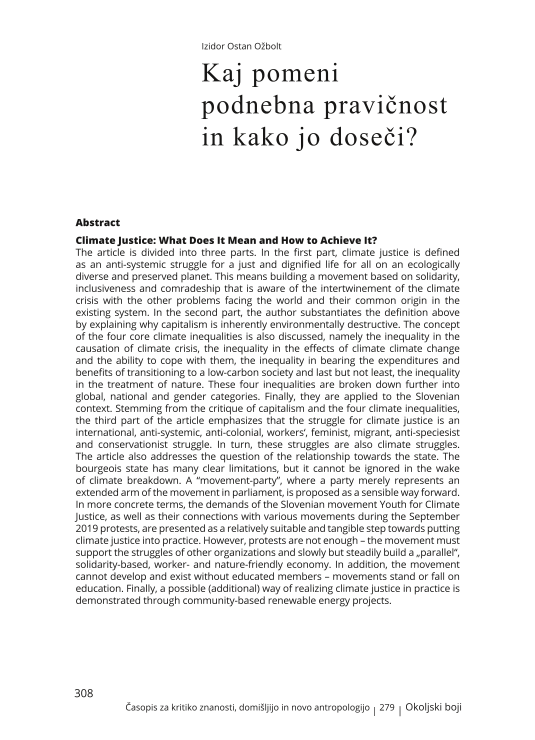The article is divided into three parts. In the first part, climate justice is defined as an anti-systemic struggle for a just and dignified life for all on an ecologically diverse and preserved planet. This means building a movement based on solidarity, inclusiveness and comradeship that is aware of the intertwinement of the climate crisis with the other problems facing the world and their common origin in the existing system. In the second part, the author substantiates the definition above by explaining why capitalism is inherently environmentally destructive. The concept of the four core climate inequalities is also discussed, namely the inequality in the causation of climate crisis, the inequality in the effects of climate climate change and the ability to cope with them, the inequality in bearing the expenditures and benefits of transitioning to a low-carbon society and last but not least, the inequality in the treatment of nature. These four inequalities are broken down further into global, national and gender categories. Finally, they are applied to the Slovenian context. Stemming from the critique of capitalism and the four climate inequalities, the third part of the article emphasizes that the struggle for climate justice is an international, anti-systemic, anti-colonial, workers‘, feminist, migrant, anti-speciesist and conservationist struggle. In turn, these struggles are also climate struggles. The article also addresses the question of the relationship towards the state. The bourgeois state has many clear limitations, but it cannot be ignored in the wake of climate breakdown. A “movement-party”, where a party merely represents an extended arm of the movement in parliament, is proposed as a sensible way forward. In more concrete terms, the demands of the Slovenian movement Youth for Climate Justice, as well as their connections with various movements during the September 2019 protests, are presented as a relatively suitable and tangible step towards putting climate justice into practice. However, protests are not enough – the movement must support the struggles of other organizations and slowly but steadily build a „parallel“, solidarity-based, worker- and nature-friendly economy. In addition, the movement cannot develop and exist without educated members – movements stand or fall on education. Finally, a possible (additional) way of realizing climate justice in practice is demonstrated through community-based renewable energy projects.




